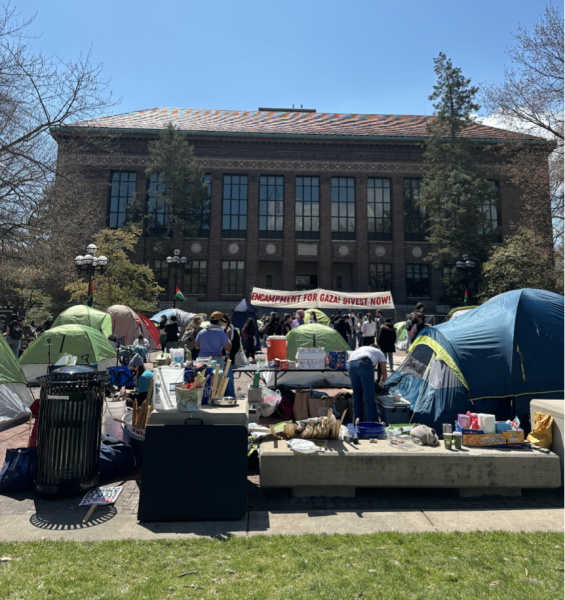Women should be ‘spiritual leaders’ but title matters, says Rabbi Shlomo Riskin
Hundreds hear Chief Rabbi of Efrat at talk sponsored by Shalhevet Institute and B’nai David
PIONEER: Rabbi Shlomo Riskin said leading rabbis supported his allowing women to carry the Torah from the very beginning.
June 4, 2015
Women in Orthodox Judaism should be Torah scholars and spiritual leaders, even though they should not be called “rabbi” or “rabba,” according to Rabbi Shlomo Riskin.
The Chief Rabbi of Efrat, a Modern Orthodox authority who is founder of the Ohr Torah Stone international network of yeshivas, spoke about women’s role in Judaism at an event co-sponsored by the Shalhevet Institute at B’nai David Tuesday evening. He had flown to Los Angeles specifically for this event and returned to Israel when it was over.
In front of hundreds of community members, Rabbi Riskin answered questions from B’nai David’s Rabbi Yosef Kanefsky, Shalhevet Institute director Rabbi Ari Schwarzberg, and the audience.
His talk was titled: “Orthodox Female Spiritual Leadership: An Idea Whose Time Has Come.”
“When I saw that there were young women who truly wanted to learn and could learn beautifully well, I saw it as being very necessary [to teach them],” said Rabbi Riskin.
Throughout the nearly hour-and-a-half question and answer session, Rabbi Riskin discussed examples of learned women in Tanach, various opinions on women’s learning and leadership, and what a woman scholar’s title can and should be.
“I think this is a topic near and dear to the Shalhevet community,” said Rabbi Schwarzberg, who helped organize the event with B’nai David, in an interview later. “And at B’nai David they just made a decision to bring on a female full time as a clergy member.”
Rabbi Riskin told the audience that he met with some controversy when he first began letting women perform hakafot — the custom of carrying the Torah around the synagogue, which was traditionally done by men. So at that time, he consulted Rabbi Joseph Soloveitchik and Rabbi Moshe Feinstein – two of the most revered American rabbis of the 20th century – if his shul should continue to allow them to perform the custom. Both supported him.
He said Rav Moshe told him he might not have started this practice himself, but that he should not stop.
“He said to me, ‘If you don’t continue with it, some of the women may leave the synagogue and leave Orthodoxy — so you must continue,'” said Rabbi Riskin.
After that, Rabbi Riskin went to the Lubavitcher Rebbe, Rabbi Menachem Mendel Schneerson. He said they studied various parts of the Talmud together for nearly two hours until they arrived at an answer.
“He told me: ‘Not only may you do it, you must do it given the nature of my synagogue,” said Rabbi Riskin. “[He also said to me:] ‘The world will be redeemed only through love and kindness and womens’ voice in Torah.'”
After arriving at the conclusion that women can have leadership roles, Rabbi Riskin responded to a question from the audience asking what a woman leader’s title should be.
“I like the title Morateinu,” which is being used by Yeshivat Maharat graduate and Torah scholar Alissa Thomas-Newborn, the new assistant spiritual leader of B’nai David. He received immediate applause.
He mentioned other titles as well, including manhigah ruchanit, spiritual leader, which he confers in the women’s yeshiva he founded in Efrat. In that yeshiva, women study for five years, as do men in Efrat’s rabbinical school.
“I’ll say a word about the elephant in the room: the name I do not use is Rabbi or Rabba,” said Rabbi Riskin. “The Rabbi is expected to read the Torah and very often to serve as the cantor of the congregation…This I do not believe women can do halakhically.”
Elaborating, he explained a point about the halakhic concept of obligation.
“Jewish law says, ‘if you are obligated to do something and I am obligated to do something, I can do it for you because we both have the same obligation,'” Rabbi Riskin said. “In terms of the public reading of the Torah, Jewish law says that the congregation of men is obligated to read the Torah and not the congregation of women.”
He also said the controversy surrounding such changes was a good thing and that all viewpoints should be respected. He quoted the late Israeli Prime Minister Golda Meir, who once declined to read a new version of the Passover Haggadah because, she said, she wanted her grandchildren to be reading the same words as her grandparents did.
When asked about the acceptance of women spiritual leaders in the future, he said the answer lay with those who pioneer the changes.
“It behooves congregations that are involved in the innovations to work very hard at upping the commitment to Jewish life and Jewish law everyday,” said Rabbi Riskin. “Only if innovations come from such communities will they really turn into the Judaism of the next century…and that’s a challenge really for the entire congregation.”
To support his embrace of women’s spiritual leadership, Rabbi Riskin offered examples from Tanach.
“So there are many, many models in the bible of women’s Torah leadership,” said Rabbi Riskin. “Sarah was a prophetess, and even a greater prophetess than Abraham was a prophet.”
He also referenced the judge Devora and the daughters of Tzelophehad, five sisters who convinced Moshe to change the law so women could inherit property.
Rabbi Riskin also cited medieval opinions.
“Great people … urged the possibility of women to choose Torah and give Torah rulings, halakhic rulings — Sefer HaChinuch and the Chida to mention only a few,” said Rabbi Riskin.
He went on to quote Rabbi Eliyahu Bakshi-Doron, former Sephardic Chief Rabbi of Israel.
“[Rav Bakshisi-Doron] says that a woman who knows and has studied Torah can become a gedola hador –– she can become the lead Torah spokesman of the generation.”
Rabbi Riskin was the founder and rabbi of Lincoln Square Synagogue in Manhattan before moving to Israel in 1983 to become founding chief rabbi of the settlement of Efrat.
Located in the hills of the West Bank south of Jerusalem but inside the security fence, Efrat has about 10,000 people and 28 synagogues, he told the audience in Bnai David.
Over the past couple of months there has been a question about whether or not the chief Rabbi of Israel will replace Rabbi Riskin because of his views.
“[This is] because his positions on matters of conversion and maybe women’s leadership roles are different than the chief rabbis of Israel,” said Rabbi Schwarzberg.
“They told him that they want to meet with him, and a lot of people who are major supporters of Rabbi Riskin are very upset, almost furious, at the chief rabbinate that they would question his status as the chief rabbi of Efrat.”
The large crowd at B’nai David, which represented many area synagogues and schools, seemed to suggest he continues to have great influence and credibility among Modern Orthodox Americans.














